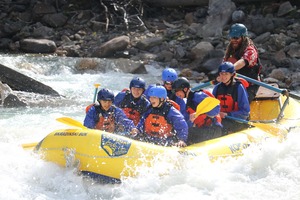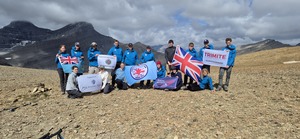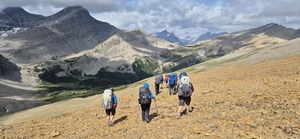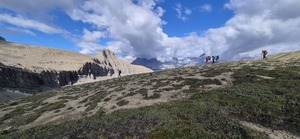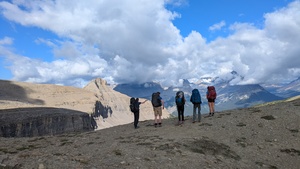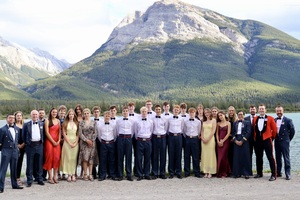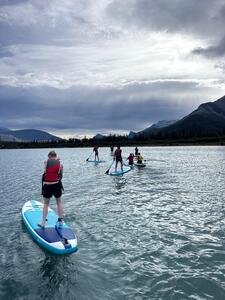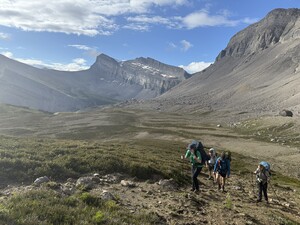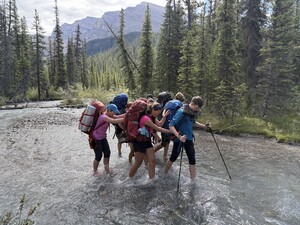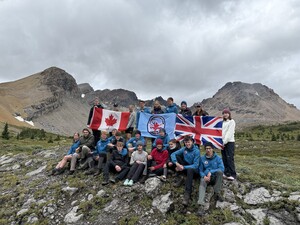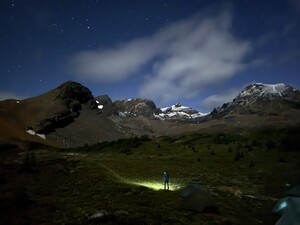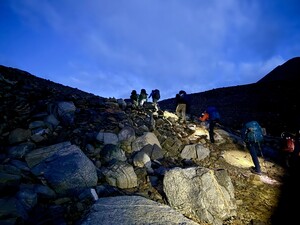Leadership on the High Ground: Cadets Conquer Canada’s Rockies
MOUNTAIN STORM 25 was the culmination of a year-long programme of selection, preparation, and training by the cadets and well over a year of planning by the staff of this exhilarating expedition. This ambitious expedition involved the deployment of a team of cadets and staff from all over the country to Alberta’s Rocky Mountains, where they tested their endurance, leadership, and teamwork against some of the most dramatic terrain in North America. Supported by the Ulysses Trust, the expedition enabled young people to take part without financial constraints.
The objectives of the exercise are to develop cadets into the citizens and leaders of the future via growing leadership skills through exercise responsibilities & decision-making, enhancing teamworking skills by participating in group tasks & navigating challenges together, providing an exciting & adventurous experience in a unique & challenging environment, fostering camaraderie & cultural understanding with Canadian counterparts and developing an understanding of the impact of climate change through immersive experiences.
Before Exped
Planning began in early 2024 with a nationwide call for participants. 120 cadets applied to this event, an overwhelming response, really demonstrating the value of this trip. After a demanding selection process assessing general fitness, practical learning abilities, and – most importantly – attitude and leadership/teamwork potential, 22 cadets were selected for the expedition. During the selection weekend, interviews were conducted with all participants as well as structured learning to introduce candidates to the different procedures that would have to be followed when in Canada.
Within the UK, over 20 staff delivered the structured training programme, holding monthly weekend sessions and intensive phases to prepare the team from October 2024 up to departure to Canada in August 2025. Navigation, campcraft, mountain safety, expedition first aid, leadership and physical conditioning all featured prominently. Training exercises on Dartmoor, the Brecon Beacons and Snowdonia helped cadets develop resilience and teamwork in realistic conditions. A cadet who had never walked beyond their local park soon found themselves confidently navigating across open moor in poor visibility – a skill that would prove invaluable overseas.
From the outset, financial inclusion was a priority. Individual and team equipment were issued or loaned; travel and accommodation costs were subsidised. For several cadets, it was their first opportunity to access high-quality adventure training equipment, levelling the playing field and fostering a powerful sense of shared purpose.
The Expedition
In early August 2025, the team deployed to Canmore, Alberta, Canada, accompanied by eight supporting staff who provided expert guidance and safety oversight. For two and half demanding weeks in and around Banff National Park and the surrounding Rocky Mountains, cadets applied everything they had learned in training from the preceding 11 months.
Mountain trekking formed the core of the expedition. Steep, technical routes and terrain up to almost 3,000m challenged navigation skills, fitness, and personal resolve. The cadets themselves planned phases, managed rations, and led daily briefs, with staff deliberately stepping back to encourage independence and leadership. Cadets also found niches within the team, whether that be cooking, keeping up morale, or setting up tents upon arriving at each campsite.
Post Expedition
After the expedition itself, the cadets, liaising with the staff, had budgeted activities such as a formal dinner night with the Royal Canadian Air Cadets, and a number of distinguished guests, which served as a proud culmination of the expedition itself, offering a moment of reflection and recognition for the achievements of the entire group. Dressed for a formal dinner, the cadets gathered in a traditional setting that honoured military customs and celebrated the spirit of service. Speeches, toasts, and shared stories underscored the bonds that had formed during their time together in the Rockies. It was an evening that reinforced esprit de corps, instilled pride in their conduct, and reminded everyone of the values they represent as cadets and future leaders.
Other activities included White Water Rafting on the Kicking Horse River: navigating the churning waters of the Kicking Horse River (up to Class 4 rapids) was both a physical and mental challenge for the group. With adrenaline pumping and rapids surging, success depended entirely on cohesive teamwork and clear, confident communication. Each raft of cadets quickly discovered that paddling in sync and listening closely to their guide’s commands was essential to staying upright and on course. Through the thrill of white-water rafting, the group not only strengthened their collaboration skills but also developed a deeper appreciation for mutual trust and quick thinking under pressure with the unique scenery afforded by the Canadian mountains.
The alpine landscapes surrounding Radium Hot Springs and the Canmore Nordic Centre provided an ideal backdrop for adventure and personal growth. For many in the group, zip-lining over deep forested valleys and mountain biking along steep, winding trails was a first-time experience, pushing them out of their comfort zones. These activities required courage, balance, and focus – traits that were honed throughout the day. As confidence grew, so did camaraderie, with cadets cheering each other on and offering support at every challenge. The experience left everyone with a lasting sense of accomplishment and newfound belief in their abilities.
Finally, cadets were left awestruck by the visit to the Athabasca Glacier, where they trod on thousand-year-old ice and learned about the history and troubling future. Lessons were also learned about the choice of footwear necessary on ice as some found ice to be rather slippery.
The cadets also explored local attractions across Banff National Park, gaining not only a love of Canada’s spectacular wilderness but also a richer appreciation of the communities that live alongside it.
Inclusion and Impact
For some participants, Ex MOUNTAIN STORM 25 was their first trip outside the UK; for others, their first extended time away from home. One cadet remarked,
“I didn’t think I’d ever see mountains like this, let alone climb them.”
Another said,
“It didn’t matter who had the best kit or the most experience – we all had to look after each other.”
The expedition’s deliberate focus on removing financial obstacles meant every cadet could engage fully, regardless of background. By funding specialist clothing, equipment, and overseas transport, the Ulysses Trust and supporting organisations ensured that talent, enthusiasm, and commitment – not household income – determined who took part.
The result was far more than an overseas adventure. Cadets returned with sharpened leadership skills, a deeper understanding of teamwork under adversity, and a renewed belief in what they could achieve. These qualities will serve them throughout their RAF Air Cadet service and beyond, whether in the Armed Forces, higher education, or civilian careers. Parents also remarked on the changes observed in the cadets on the return home, one saying that “ Photos don’t do it justice…to give our youngsters an opportunity of a lifetime; a set of memories to last for a lifetime; and an experience that has shaped them for their lives ahead – building resilience, determination, teamwork, camaraderie, commitment, confidence and so much more.”
Legacy
Exercise MOUNTAIN STORM 2025 proves what is possible when opportunity is opened to all and supported by a mix of highly motivated staff and committed supporting charities and organsiations, whom without the adventure would not be possible. By combining structured training, international challenge, and strong financial support, the project delivered an experience that will shape the lives of every participant.
The mountains of Alberta may now be behind them – but the lessons learned about resilience, courage, and leadership will guide these cadets for years to come.

